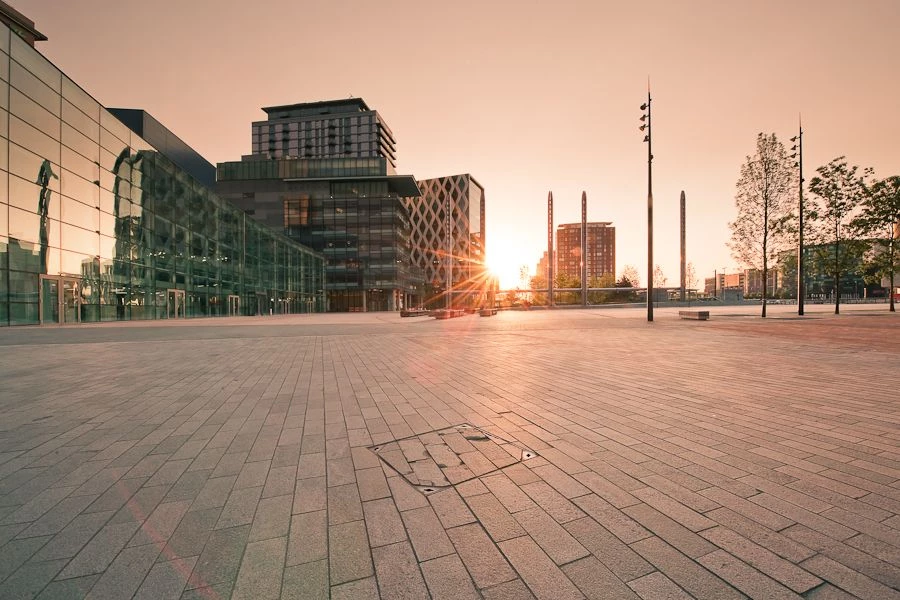
Partner Article
MediaCity: It's not so bad up North
Salford’s MediaCity has been a great success so far, but the area and region as a whole still have a way to go. This was the clear message coming from some of the North West’s most influential media heads last week.
Speaking at the North West Business Leadership Team (NWBLT) forum on Thursday, Alice Webb, chief operating officer for BBC North, Jane Luca, controller of external affairs for ITV and Paul Newman, director of communications for MediaCity UK all heralded the achievements of the two-year old scheme in Salford.
The panel said that while the economic ripples made by MediaCity are being felt, improved infrastructure, greater connectivity and coherence between different projects were imperative for future growth.
BBC North’s Alice Webb highlighted the benefits felt by the BBC since they moved a large amount of their operations, including the entirety of BBC Sport, to the North West.
“When we set out on this endeavour there was a leap of faith that everybody had to take. The buildings weren’t even here, and people thought “Are you mad?” This wasteland was going to be created into a Media City?
“We’re here now, and in large scale. We have 2,500-3,000 people here everyday. Cynicism, particularly within the BBC, has died down. If you look at the BBC staff survey, every percentage point is up.
“Staff are 50% more engaged, 15% happier, so actually, we’re getting to the point where people are asking, “How do we do what they do?”
“I mean, ‘shock horror’, BBC Breakfast can get world class guests to come to Salford. By the way BBC Breakfast’s viewing figures have improved since we moved in.”
“We chose MediaCity for the openness and publicness of that realm and being somewhere we can collaborate with the likes of ITV and smaller organisations as well.”
ITV are set to move their operations across to MediaCity from their historical city centre site in Manchester.
Jane Luca, from ITV, commented: “We have 500 or so staff are here now. Coronation Street is in the process of being rebuilt.
“17 different kinds of bricks have been sourced, not to mention a lot of cobbles! So we’re replicating the set in Salford now.
“So far everyone is loving it because it’s allowing us to be more open plan, people are mixing up and it’s been very exciting for us.”
Paul Newman, for MediaCity, echoed Ms Webb’s sentiments, and said the original “leap of faith” needed for companies to move to MediaCity should pay off.
He said: “What we’ve demonstrated in the first two years of studio operation is that buildings and money will come. That’s endemic of regeneration as a whole.
“If you go back 20 years […] this place was written off, the docks were dying. Now people complain about traffic, whereas in the early 1980s this area had no rush hour. But you need that. You need to feel that people are busy.
“We’ve still got another 30 years to go, and it’s not just about this area. Other parts of the NW region need a similar treatment. The trick is how you manage the investment with different parts of industry.
“One of the critical issues is the whole infrastructure and delivery, not just by local authority, but by central government on major schemes.
“If you don’t have the infrastructure you’re wasting your time. One of the BBC’s challenges is broadband.
“You can get 100 Mb broadband here, but down the road you can’t even get 2Mb! That’s because there is no joined up strategy on that sort of communication.”
The panel further suggested that better communication across different schemes within the North West would help position Manchester and Salford in a global context.
Ms Luca, commented: “Having an international dimension is really important. This is about getting us onto a global scale.”
Ms Webb added: “Connection is really important thing for MediaCity, both for Manchester and for the region.
“You can absolutely see how this place is coming alive. But the whole story for the region about the media and digital innovation needs to be joined up.
“There are other fabulous projects in the area such as the Northern Quarter and The Sharp Project. What we really need is to join all these schemes up.
“We need to make sure we have ambition and we translate our story to the rest of the UK and internationally.”
Mr Newman concluded: “There’s still a lot to do demonstrably, and from MediaCity’s perspective as a commercial organisation it’s about quality of infrastructure and planning permission, which of course take a lot of time.
“Without the ability to attract people for a variety of reasons, there’s no hope for growth. And it’s growth we need to fund further investment, to grow what we have here now.”
This was posted in Bdaily's Members' News section by Miranda Dobson .








 Raising the bar to boost North East growth
Raising the bar to boost North East growth
 Navigating the messy middle of business growth
Navigating the messy middle of business growth
 We must make it easier to hire young people
We must make it easier to hire young people
 Why community-based care is key to NHS' future
Why community-based care is key to NHS' future
 Culture, confidence and creativity in the North East
Culture, confidence and creativity in the North East
 Putting in the groundwork to boost skills
Putting in the groundwork to boost skills
 £100,000 milestone drives forward STEM work
£100,000 milestone drives forward STEM work
 Restoring confidence for the economic road ahead
Restoring confidence for the economic road ahead
 Ready to scale? Buy-and-build offers opportunity
Ready to scale? Buy-and-build offers opportunity
 When will our regional economy grow?
When will our regional economy grow?
 Creating a thriving North East construction sector
Creating a thriving North East construction sector
 Why investors are still backing the North East
Why investors are still backing the North East